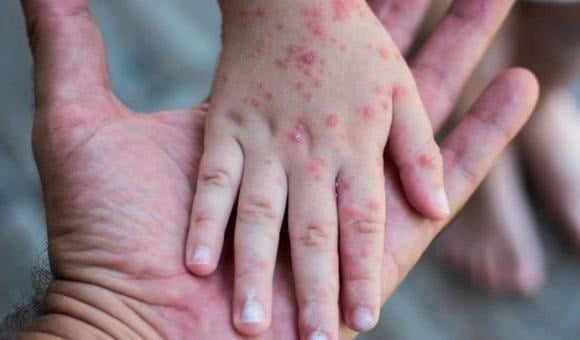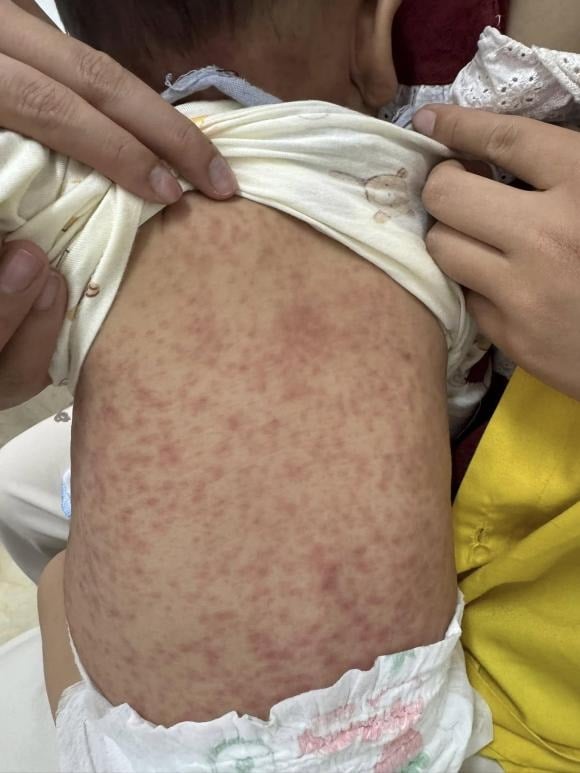Measles: Understanding the Risk of Reinfection and Effective Prevention
It’s understandable that many individuals wonder about the possibility of reinfection after receiving measles vaccination or recovering from the disease. According to the Hanoi Center for Disease Control and Prevention (CDC), the number of measles and hand, foot, and mouth disease cases in the area continued to rise in early April 2025, with over 400 cases reported weekly from March 28 to April 4, the highest figure so far this year.
Specifically, Hanoi recorded 206 cases of measles and 203 cases of hand, foot, and mouth disease. The CDC attributed most measles cases to individuals who had not been vaccinated or had not completed their vaccination regimen. It is anticipated that Hanoi will continue to record more measles cases in the coming days.
Can measles reappear after the initial infection?
Measles is a highly contagious disease caused by a virus. After contracting the measles virus, the incubation period typically ranges from 7 to 14 days. Initial symptoms of measles include:
High fever, with temperatures exceeding 39 degrees Celsius.
Cough, sneezing, and runny nose (due to respiratory tract inflammation)
Red, watery eyes (conjunctivitis)
After about 2-3 days, the patient will exhibit small white spots inside the mouth (Koplik’s spots), which are an early indicator of measles. Approximately 3-5 days later, a rash will appear, starting behind the ears and spreading to the face, chest, abdomen, and eventually the entire body. This rash eventually fades, leaving characteristic dark spots known as “tiger skin.”
It is a common concern whether an individual can contract measles again after recovering from it. In reality, if you have been vaccinated or previously infected with measles, you develop lifelong immunity and are highly unlikely to be reinfected.

While most individuals develop long-lasting immunity after recovering from measles or receiving the measles vaccine, a small number of people may experience secondary measles infections. This occurs when an individual’s immune system weakens over time, making them susceptible to the virus again.
Caring for Measles Patients
Currently, there is no specific antiviral medication for measles. If you suspect that your child has measles, seek medical attention at the nearest healthcare facility and avoid crowded places to prevent further spread.
For patients with mild measles, home care is possible under the guidance of a physician. The care regimen includes:
Isolating the patient from healthy individuals, especially unvaccinated children.
Administering fever-reducing medications if the patient’s temperature rises above 38.5 degrees Celsius, as advised by a doctor.
Supplementing with vitamin A throughout the illness, as directed by a physician.
Breastfeeding for infants, offering more frequent feeds, and ensuring adequate fluid intake. Older children can be given a well-balanced diet and fruit juices. Soft, easily digestible foods are recommended, prepared without spicy ingredients, and divided into smaller meals.

Hygiene practices include cleaning the eyes, nose, and throat with saline solution three times daily. Bathe and clean the patient daily, avoiding prolonged baths to prevent chilling. Caregivers must wear masks and sanitize their hands before and after interacting with the patient.
If a child’s fever persists beyond 48 hours after the rash has disappeared, or if the fever returns after initially subsiding, seek medical attention immediately. Additionally, watch for symptoms such as severe coughing, lethargy, rapid breathing, or any other abnormal signs, and seek emergency care if necessary.
In conclusion, measles is a highly contagious disease, especially among children. Therefore, prevention is crucial. The Ministry of Health recommends that children over nine months of age receive the measles vaccine or the combined measles, mumps, and rubella vaccine to effectively prevent measles. Ensuring proper nutrition to boost immunity and seeking medical attention at the first sign of measles symptoms are also vital to avoiding potentially severe complications.









